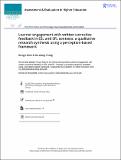Learner engagement with written corrective feedback in ESL and EFL contexts : a qualitative research synthesis using a perception-based framework
Abstract
Although research on the efficacy of written corrective feedback has received considerable attention in recent years, there is a dearth of research on learner engagement with written corrective feedback. Understanding how language learners engage with written corrective feedback is high on the agenda of feedback research because it provides a broadened perspective that feedback uptake is only one form of engagement, and that engagement with written corrective feedback is influenced by myriad contextual and individual factors. To narrow the research gap, this qualitative research synthesis examines learner engagement with written corrective feedback in English writing contexts through the lens of ecological systems theory and a perception-based framework. Focusing on 14 articles, relevant information was extracted and synthesised following three iterative stages informed by grounded theory to identify common engagement patterns and clarify relationships between factors affecting how learners engage with written corrective feedback. The results reveal the dynamic, contextualised and individualised nature of learner engagement with written corrective feedback. Pedagogical implications for practitioners are discussed to address the lingering issues around learner engagement with written corrective feedback.
Citation
Shen , R & Chong , SW 2022 , ' Learner engagement with written corrective feedback in ESL and EFL contexts : a qualitative research synthesis using a perception-based framework ' , Assessment & Evaluation in Higher Education , vol. Latest Articles . https://doi.org/10.1080/02602938.2022.2072468
Publication
Assessment & Evaluation in Higher Education
Status
Peer reviewed
ISSN
0260-2938Type
Journal article
Collections
Items in the St Andrews Research Repository are protected by copyright, with all rights reserved, unless otherwise indicated.

